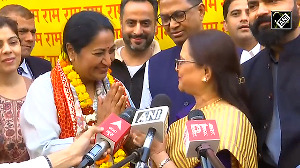'This shows how casually these officials approached a dispute simmering for years which finally erupted into violence.'
Jyoti Punwani reports.

"Nero fiddling while Rome burnt."
That's how Advocate B G Bansode described the actions of Saurabh Rao, who was collector of Pune district when the January 1, 2018 riot at Bhima Koregaon took place.
Rao is currently divisional commissioner, Pune.
Bansode's remarks came as Rao was deposing on June 6 before the Bhima Koregaon Commission of Inquiry headed by Justice J N Patel in Pune.
Bansode, who represents Dalit victims before the Commission, referred to two specific intelligence reports that warned of trouble around December 31, 2017.
The Elgar Parishad was planned for December 31 in Pune. And on January 1, huge crowds were expected at Bhima Koregaon, to celebrate the 200th anniversary of the victory of the British over the Peshwas.
Bansode cited reports by Santosh Rastogi, vigilance commissioner (intelligence), state of Maharashtra and deputy commissioner of police, Special Branch, Pune, which had been submitted to Rashmi Shukla, then Pune's police commissioner.
Bansode told this reporter that these reports contained the names of leaders and organisations who were unhappy with the proposed Elgar Parishad scheduled for December 31, 2017.
Among the organisations named were the Bajrang Dal and the Pune-based Patit Pawan Sanghatan, both militant Hindutva organisations.
Among the individuals named was Milind Ekbote, former Bharatiya Janata Party corporator and head of the Samastha Hindu Aghadi.
As it turned out, Ekbote did end up as an accused in the matter. He was named as one of two persons responsible for the January 1 violence, in the very first FIR filed in the case. The second person named along with him was Sambhaji Bhide, head of the Shiv Pratisthan.
Rao told Bansode that he had not seen these intelligence reports.
***
As collector, Rao was aware of the dispute that broke out in village Vadhu Budruk three days before January 1 between Dalit and Maratha villagers, over a board that said that Govind Gopal Gaekwad (a Mahar) had performed the last rites of Sambhaji Maharaj.
Some Marathas, who believed that the Shivale family, one among them, had performed the last rites, tore down this board and damaged the canopy of the samadhi.
Cases were filed against the Marathas under the SC/ST Atrocities Act. Angered by the dispute and the cases, the sarpanches of Vadhu Budruk and Bhima Koregaon decided to observe a bandh on January 1, and informed the police about this.
The bandhmeant that the lakhs of Dalits who arrived there could get nothing to eat or drink -- the first time this had happened.
Strangely, as the collector, Rao said he knew nothing about this bandh. The police had not passed on this information to him, he said.
But the dispute itself was not something new for Rao during his tenure as collector.
As far back as 2015, he had received a memorandum from the Buddhist Prerna Group, asking that the name of Govid Gopal Gaekwad be restored on the original board outside Sambhaji Maharaj's samadhi.
Rao told Bansode he had forwarded this memorandum to the SP and the Tehsildar and told them to take action within eight days.
However, he did not follow up on this, hence he didn't know if any action had been taken.
Bansode then told him that had he resolved the matter then, things wouldn't have escalated the way they did in village Vadhu Budruk on December 29, 2017.
However, Rao didn't agree, saying that there were "multiple factors" that led to the incident at Vadhu Budruk and the violence on January 1, 2018.
***
Strangely, Rao also claimed he was not aware that the samadhi of Sambhaji Maharaj was now being managed by Milind Ekbote's Dharamveer Sambhaji Maharaj Smruti Samiti.
The samadhi was a State-protected monument, he said, and hence under the control of the state archeological department. Only the gram panchayat of village Vadhu Budruk could look after it.
If Milind Ekbote's trust was managing its affairs, it was not "legally justifiable", Rao said.
He admitted that he could, as divisional commissioner, take action against the Vadhu Budruk Gram Panchayat for letting Ekbote run the affairs of the samadhi.
***
"Both as collector and divisional commissioner, Rao is in charge of the district; he is definitely responsible for law and order even more than the police," Bansode told this reporter.
"Yet Saurabh Rao seems to have depended on the police for everything in this important matter. This shows how casually these officials approached a dispute simmering for years which finally erupted into violence."
Feature Presentation: Aslam Hunani/Rediff.com











 © 2025
© 2025